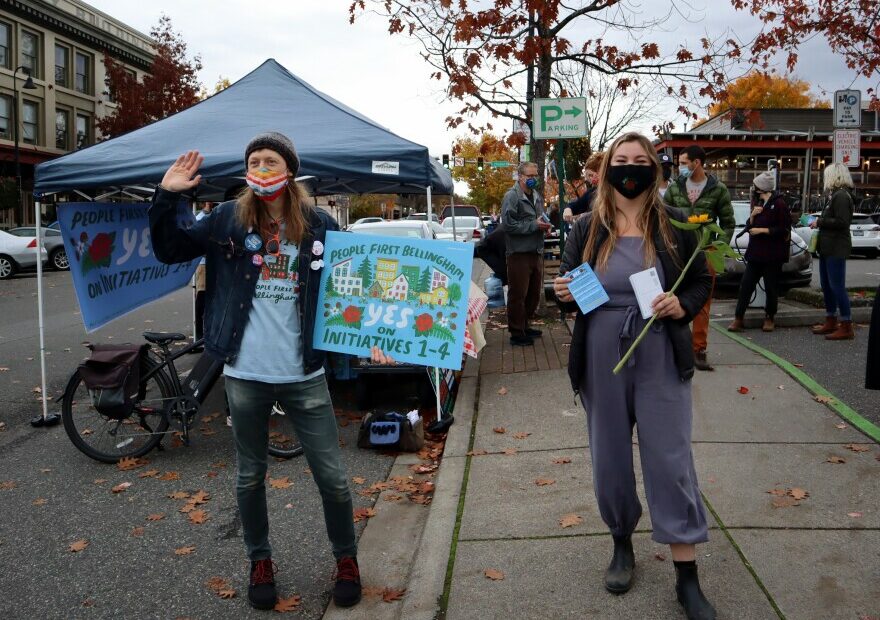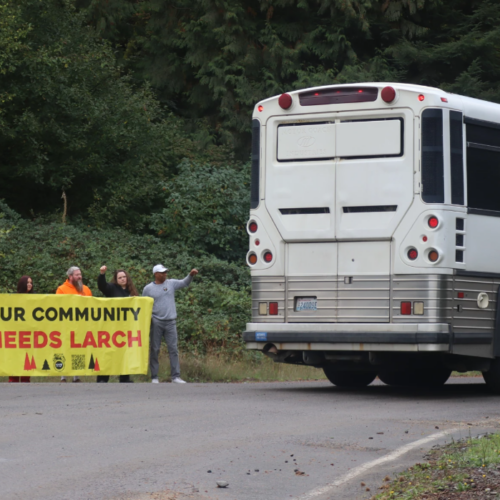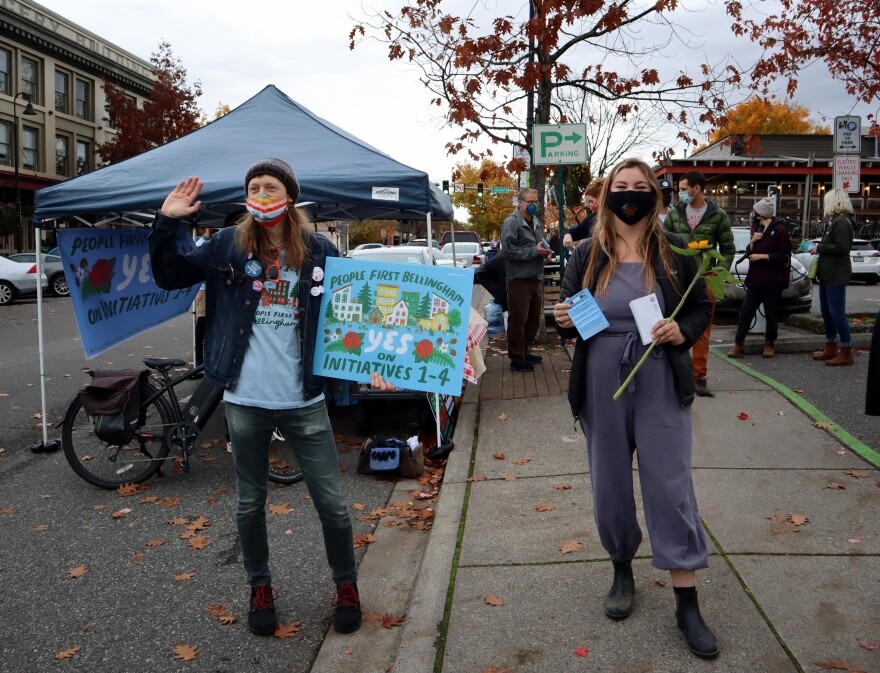
A Grab-Bag Of Juicy Local Measures On Nov. 2 Ballot In Absence Of Statewide Initiatives
Listen
There are no statewide initiative measures on the ballot this November in Oregon and Washington state. That’s a change from usual, but voters around the region are casting ballots on a variety of newsworthy local initiatives.
Among them, another county in Oregon will vote on the idea of moving Oregon’s border so rural counties can join “Greater Idaho.” Voters in Cannon Beach and Newport, Oregon, are being asked to approve a sales tax on restaurant and deli food. A measure in Yakima, Washington, is aimed at registering discontent with possible local income taxes.
A recurring theme across the Pacific Northwest this election involves aspects of the tight housing market. County and city councils up and down the West Coast have wrestled with housing supply and affordability for years. Now, local activists are going to the voters in several places to seek stronger action. One such place is the central Oregon Coast and another is Bellingham, Washington.
A progressive coalition called People First Bellingham took inspiration from Portland to place a tenant rights proposition on the November ballot. Bellingham Initiative 1 would require landlords to provide relocation assistance equal to three months rent for renters who are forced to move because of large rent increases — defined as anything more than 8%. It also requires longer advance notice when landlords increase the rent by more than 5% — 90 days notice instead of the 60 days in current law.
“I had affordable housing, but every year when my lease came up for renewal there was just this pit in my stomach of like, ‘Is the year I am going to be priced out?'” said campaign organizer Sage Jones, while canvassing for support at the Bellingham Farmers Market last weekend.
Jones said adopting rules like Portland’s mandatory relocation assistance would reduce renters’ anxiety.
“From the conversations we’ve had with organizers down there, it sounds like it has really helped keep neighborhoods more stable by keeping people from being economically evicted from where they’re living,” Jones said.
Since the Bellingham initiative was drafted, the Seattle City Council has also voted to require landlords to pay relocation assistance equal to three months of rent for low-income tenants who depart because of rent increases above 10 percent.
The renter protection initiative is one of four city ballot measures that People First Bellingham qualified for the November 2 election. The others have to do with police technology, union organizing and requiring hazard pay for on-site and frontline workers during states of emergency, like this pandemic.
Washington state restaurant, retail and grocery industry associations are pouring in money to defeat the hazard pay initiative. The renter protection measure has only a token amount of business opposition.
Earlier this month, the liberal-leaning Bellingham City Council voted unanimously to recommend that voters reject all four measures.
“The council has said we actually appreciate very much what these initiatives intend to do,” Michael Lilliquist said before explaining that he and other council members are worried about unintended consequences.
In an interview, Lilliquist said he is dubious about the utility of requiring landlords to provide relocation assistance to displaced tenants.
“That creates additional costs for the landlords and they’re going to find ways around that cost or pass that cost along,” Lilliquist said. “It is unclear to me whether or not that will actually protect renters from rising rents.”
Short-term vacation rentals targeted on Oregon’s coast
Voters on the central Oregon Coast will also get to weigh in on rental housing, but from a different angle. A group named “15 Neighborhoods” collected signatures to put a five-year phase-out of short-term vacation rentals on the November ballot. It would affect Airbnb and VRBO-type rentals in single-family residential zones of unincorporated Lincoln County.
Campaign steering committee members Roger and Linda Keehn, who are Waldport area homeowners, said they are counting on Measure 21-203 to cut down on party houses, parking problems, beach crowds and other disturbances of the peace.
“It is an increasing problem and it is actually getting worse,” Roger Keehn said.
“We’re looking to restore our residential neighborhoods to what they were when we purchased, expecting that they would be protected from business influence in the area where we live,” Linda Keehn added.
The proposed phase-out affects about 500 nightly rentals in oceanside neighborhoods from outside Yachats up to Lincoln City. Short-term rentals inside city limits — accounting for the majority of offerings along the central coast — are unaffected by the county measure as they are separately regulated by city governments such as Newport, Depoe Bay and Lincoln City.
Supporters like the Keehns hope phasing out some vacation rentals will make more housing available for local working people who are being priced out of a very tight market.
Opponents are spending big to defeat the measure. The opposition, largely financed by vacation rental management companies, has raised 15 times as much campaign cash as the proponents have at their disposal, according to records kept by the Oregon Secretary of State. The “no” side argues the county stands to lose valuable tourist dollars, which support local jobs like that of landscape maintenance contractor Ron Graves who voiced an ad.
“If we don’t defeat 21-203, we’re likely to all have to pay higher taxes to make up for the lost revenue,” Graves said.
There could have been an even more contentious measure on ballots this November. A charter amendment would have required the city of Seattle to add 2,000 units of permanent and emergency housing for the homeless and keep parks and public spaces clear of encampments. But in late August, a county judge struck the measure called Compassion Seattle off the city ballot because she ruled it went beyond the bounds of what a local initiative can do.
A different initiative struck off the ballot in Spokane
Voters in the city of Spokane looked like they were going to have a chance to preemptively block the city from restricting natural gas hookups in the future. But a judge preemptively canceled that ballot measure too.
The local and Washington state home builders associations were behind the proposed public vote on energy use. The committee sponsoring the ballot measure said it wanted to stop the spread of what it called “Seattle-style bans on natural gas.” Earlier this year, the Seattle City Council approved a new energy code that bans gas furnaces and gas water heaters in new apartment and commercial buildings to combat climate change. The Spokane City Council president noted the council had no intention to restrict natural gas hookups when the industry pushback started.
Greater Idaho
The group Move Oregon’s Border has been collecting signatures in multiple counties to allow more voters to weigh in on non-binding initiatives to create the expanded state of “Greater Idaho.” Oregon’s sparsely-populated Harney County gets its turn to sound off at the ballot box next week. Crook and Klamath counties, and possibly others, are in line to vote in spring 2022.
The border relocation idea is driven by conservatives who believe eastern and southern Oregon counties would be happier in red Idaho than stuck in blue Oregon. Nine counties have already voted on the Move Oregon’s Border proposal during prior elections, yielding seven victories and two rejections.
There is an established process for counties to switch states, but it requires the two state legislatures to agree, plus sign-off from Congress. Democrats who run the show in Salem have shown no interest in redrawing the Oregon-Idaho state line.
Prepared food tax
Oregon has no state sales tax, but diners in the popular beach towns of Cannon Beach and Newport may find one added to their tabs when they eat in restaurants or get takeout beginning next year. Local voters will decide whether to fund a new city hall and police station in Cannon Beach by imposing a 5% tax on prepared food. The same new tax would be used to hire additional police, fire and library staff in Newport.
A high percentage of the anticipated revenue would come from visitors. However, the cities’ restaurateurs are strongly opposed to shouldering another burden on top of the COVID-19 pandemic.
“During the past 18 months no industry has struggled to survive more than the restaurant industry and that’s the exact industry the City of Newport chose to add additional tax burden,” fumed Dylan Entee of the Mo’s chowder house chain in a statement published in the local voters’ pamphlet. “Never has a local government been so tone deaf and out of touch with its local businesses.”
The Oregon cities of Ashland and Yachats have previously introduced a local sales tax on prepared food.
No income tax
The corollary to Oregonians’ famous aversion to a sales tax is the reluctance of most Washingtonians to accept a state income tax. Yakima voters will have the opportunity to send an anti-tax message this November. Proposition 3 would amend the city charter to forbid the city council from ever enacting a local income tax on residents.
When a majority of the Yakima City Council decided in August to place the question on the ballot, dissenting councilmember Kay Funk said it was a “false flag” issue designed to create chaos during the election. No one is talking about imposing a local income tax, she said, according to coverage in the Yakima Herald.
However, conservatives including the city’s mayor and a state representative applauded the move. They argued that reinforcing the absence of an income tax could give the area a business recruiting edge. A similar charter amendment was adopted by 72% of Spokane voters in 2019.
“A local income tax ban is not a ‘red herring’ or ‘waste of time’ as critics claim,” wrote Jason Mercier of the Washington Policy Center, a business-friendly think tank, in a policy note. “It is instead a reasonable and popular response to stop ongoing efforts to impose an income tax in Washington.”
Related Stories:

As Washington’s prison population shrank, the cost of incarceration went up
By: Jeanie Lindsay, Northwest News Network Keeping people in Washington’s prisons has gotten more expensive in recent years. The state is one of several where costs per prisoner have climbed

Dissolving library districts is a hot topic, WA bill could make it harder to do
Young adult books at the Columbia County Library. Some people have requested to move the YA section into the adult section because of what they call “obscene” material in 100

Washington state bill could change how rural communities could work to close a library
Young adult books at the Columbia County Library. Some people have requested to move the YA section into the adult section because of what they call “obscene” material in 100
















